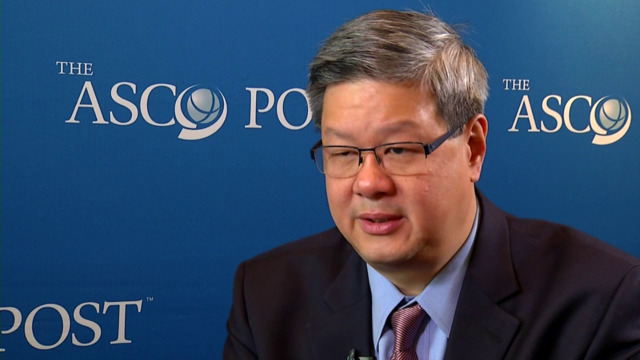Andrew D. Zelenetz, MD, PhD, on Emerging Treatment Options for Lymphomas
2015 NCCN Annual Conference
Andrew D. Zelenetz, MD, PhD, of Memorial Sloan Kettering Cancer Center, talks about the revolution in lymphoma treatment, which started with rituximab and continues with obinutuzumab, ibrutinib, and others.
Robert W. Carlson, MD, and John A. Gentile, Jr
Robert W. Carlson, MD, Chief Executive Officer, National Comprehensive Cancer Network, and John A. Gentile, Jr, Chairman, Harborside Press, LLC, discuss the early days of NCCN, controversies that surrounded the first meeting, oncologists’ embrace of the guidelines, and how the organization has evolved over the past 20 years.
Mary Lou Smith, JD, MBA
Mary Lou Smith, JD, MBA, of the Research Advocacy Network, discusses, from the perspective of a patient advocate, the value of the NCCN guidelines and the impact they have made on cancer care.
Wui-Jin Koh, MD
Wui-Jin Koh, MD, of the Fred Hutchinson Cancer Research Center and the Seattle Cancer Care Alliance, discusses the program to adapt NCCN guidelines to regions of the world with different resource availability. The first guideline to be adapted in this way is for cervical cancer, which is prevalent in the developing world.
Peter G. Shields, MD
Peter G. Shields, MD, of The Ohio State University Comprehensive Cancer Center and the James Cancer Hospital and Solove Research Institute, discusses the new NCCN Guidelines for helping patients with cancer to stop smoking. Counseling is a critical part of these new recommendations.
Robert W. Carlson, MD, and William J. Gradishar, MD
Robert W. Carlson, MD, Chief Executive Officer, National Comprehensive Cancer Network, and William J. Gradishar, MD, Robert H. Lurie Comprehensive Cancer Center of Northwestern University, discuss the evolution of the breast cancer guidelines, the inclusion of varied fields––such as plastic surgery, pathology, patient advocacy, and radiation–– and new treatment changes.





